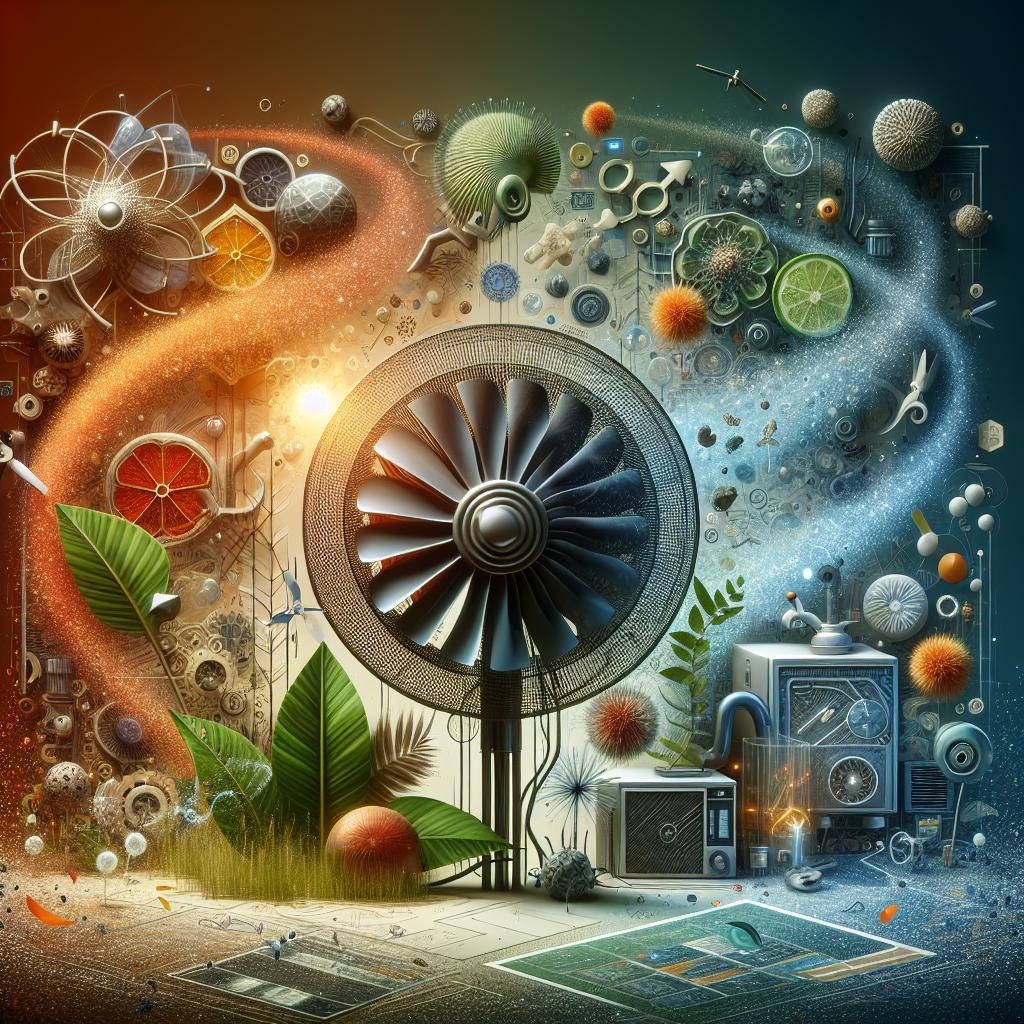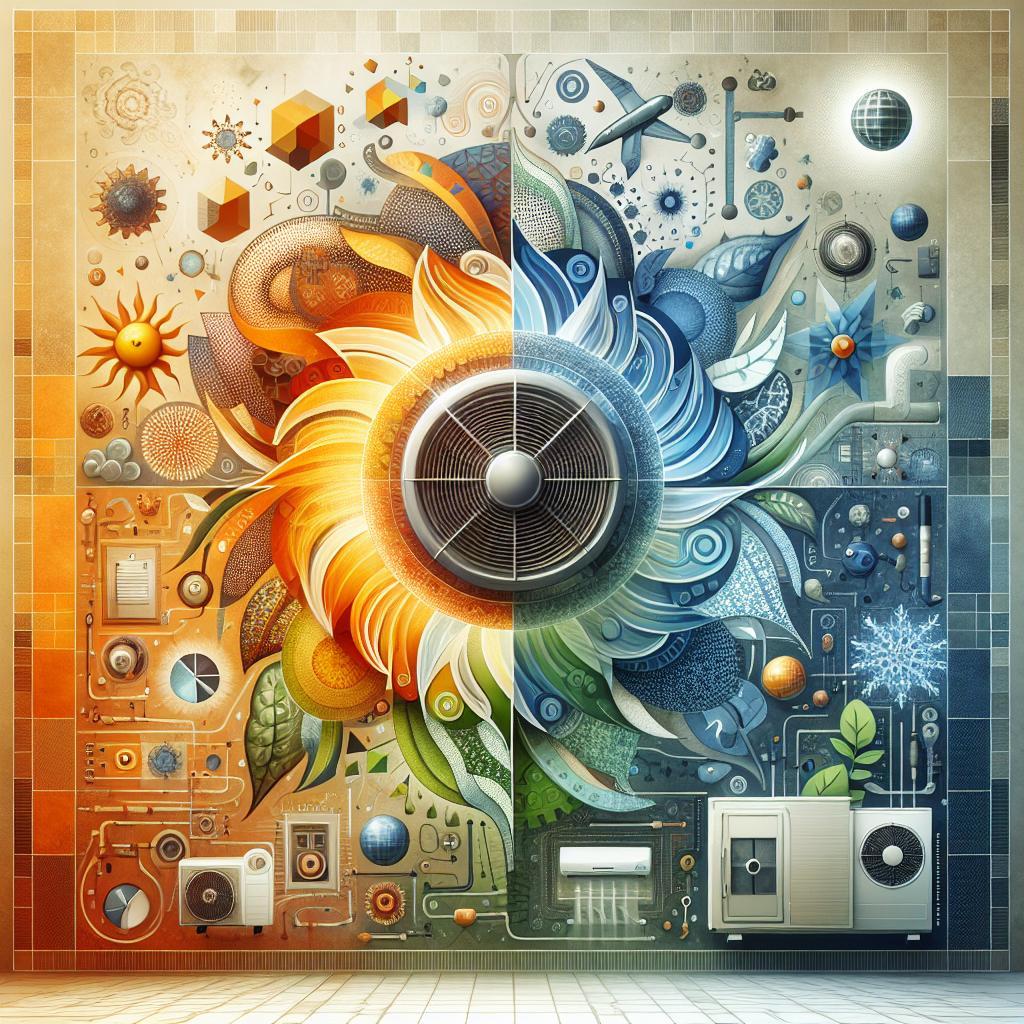In the ever-evolving world of building technology and home comfort, one acronym stands as the linchpin of climate control: HVAC. For many, the letters may evoke thoughts of temperature moderation, indoor air quality, and energy efficiency, but what do they truly signify? Delving into the essence of HVAC not only uncovers its functional meaning—Heating, Ventilation, and Air Conditioning—but also reveals its pivotal role in shaping the environments we inhabit. As we explore the components and significance of HVAC systems, we invite you to join us on a journey through the whirring ducts and humming compressors that keep our spaces comfortable and safe, while also maintaining the delicate balance of energy consumption and sustainability. Whether you’re a homeowner, a budding technician, or just curious about the intricacies of your living space, understanding HVAC opens the door to better choices for your comfort and health.
Understanding the HVAC Acronym and Its Components
To fully grasp what HVAC entails, it’s essential to break down its components: Heating, Ventilation, and Air Conditioning. Each element serves a crucial function in maintaining indoor air quality and comfort. Heating systems provide warmth during colder months, ensuring that spaces remain cozy. Ventilation facilitates air circulation, introducing fresh air while removing stale, humidity-laden air, contributing to healthier environments. Lastly, Air Conditioning cools indoor spaces, making them bearable during hot seasons. Together, these components create a balanced system that promotes optimal comfort levels, irrespective of external weather conditions.
The intersection of these three components may not always be straightforward, but they work synchronously to enhance living and working conditions. Below is a simple overview of the HVAC components along with their primary functions:
| Component | Primary Function |
|---|---|
| Heating | Provides warmth |
| Ventilation | Circulates fresh air |
| Air Conditioning | Cools indoor spaces |
Understanding these components not only helps in selecting the right systems for your needs but also aids in recognizing the importance of regular maintenance. Proper upkeep ensures efficiency and longevity, making it an integral part of any HVAC plan. Whether you are upgrading an existing system or considering installation, knowledge of HVAC components equips you with the insights needed to make informed decisions.

Exploring the Importance of Heating in HVAC Systems
Heating plays a pivotal role in HVAC systems, ensuring indoor spaces remain comfortable regardless of external weather conditions. This component not only regulates temperature but also impacts air quality and energy efficiency. During the colder months, an effective heating system is essential for maintaining a cozy environment. Key benefits of heating in HVAC systems include:
- Comfort: Ensures warmth during cold spells.
- Health: Prevents cold-induced illnesses.
- Energy Efficiency: Modern systems reduce energy consumption.
- Control: Offers programmable options for user convenience.
Furthermore, the type of heating system chosen can significantly influence the overall efficiency of the HVAC unit. Different heating methods such as furnaces, heat pumps, and boilers come with distinct advantages and drawbacks. Understanding these options allows homeowners to make informed decisions tailored to their specific needs. The following table highlights the main types, their efficiency ratings, and typical applications:
| Heating Type | Efficiency Rating | Typical Applications |
|---|---|---|
| Furnace | 80% – 98% | Residential heating |
| Heat Pump | 200% – 300% | Heating & cooling |
| Boiler | 80% – 95% | Radiant heating |

The Role of Ventilation in Indoor Air Quality
Proper ventilation plays a crucial role in maintaining indoor air quality, ensuring that the air we breathe is clean and healthy. With modern airtight construction techniques, buildings often trap pollutants, humidity, and stale air, leading to a range of health issues. Effective ventilation systems allow for the exchange of indoor and outdoor air, reducing the concentration of indoor contaminants such as dust, mold, and volatile organic compounds (VOCs). Key factors that contribute to improved air quality include:
- Fresh Air Supply: Introducing outdoor air dilutes indoor pollutants.
- Humidity Control: Proper ventilation reduces excess moisture, preventing mold growth.
- Temperature Regulation: Maintaining comfortable temperatures enhances overall comfort and wellness.
To better understand the impact of ventilation on air quality, let’s examine the different ventilation strategies that can be implemented. Here’s a simple overview of various methods:
| Type of Ventilation | Description |
|---|---|
| Natural Ventilation | Utilizes windows, vents, and architectural design to promote airflow. |
| Mechanical Ventilation | Involves fans and HVAC systems to control air exchange and filtration. |
| Controlled Ventilation | Combines natural and mechanical methods for optimal airflow management. |

Cooling Solutions: How HVAC Keeps Your Space Comfortable
Understanding the mechanics behind HVAC (Heating, Ventilation, and Air Conditioning) is crucial for maintaining a comfortable environment in any space. At its core, HVAC systems function to regulate temperature, humidity, and air quality, ensuring that whether it’s sweltering heat or biting cold outside, the interior remains a sanctuary. Key components of these systems include:
- Air Conditioners: These units cool indoor air by removing heat and moisture, providing relief during hot summer months.
- Heat Pumps: Versatile systems that can both heat and cool your home by transferring heat in or out depending on the season.
- Ventilation Systems: Essential for circulating fresh air and removing stale air, improving indoor air quality.
To optimize performance, proper installation and regular maintenance of HVAC systems are essential. A well-maintained unit not only enhances comfort but also reduces energy consumption, leading to cost savings. Here’s a simple overview of benefits associated with effective HVAC maintenance:
| Benefits | Description |
|---|---|
| Improved Efficiency | Regular check-ups ensure systems run smoothly, maximizing energy use. |
| Extended Lifespan | Routine maintenance helps prevent wear and tear, prolonging system life. |
| Enhanced Comfort | Well-functioning HVAC systems maintain consistent temperatures throughout your space. |
Q&A
Q&A: Unraveling the Mystery of HVAC
Q: What does HVAC stand for?
A: HVAC stands for Heating, Ventilation, and Air Conditioning. It’s a term that encompasses the technology and systems responsible for maintaining comfortable indoor environments.
Q: Why is HVAC important in our daily lives?
A: HVAC systems play a crucial role in ensuring our living and working spaces are comfortable regardless of external weather conditions. They help regulate temperature, control humidity, and maintain indoor air quality, contributing to our overall health and well-being.
Q: How do HVAC systems work?
A: HVAC systems operate through a combination of equipment designed for each function. Heating is typically achieved by furnaces or heat pumps, ventilation involves the exchange of air (both fresh and stale), and air conditioning cools interior spaces. Together, these elements work in harmony to create an optimal indoor climate.
Q: What are the components of an HVAC system?
A: A typical HVAC system consists of several key components, including a furnace or heat pump for heating, an air conditioner for cooling, ductwork for airflow distribution, and ventilation fans to ensure fresh air circulation. Some systems may also include humidifiers or air purifiers for enhanced air quality.
Q: How can I tell if my HVAC system is working efficiently?
A: Signs of an efficiently working HVAC system include consistent temperatures throughout your space, minimal noise, low energy bills, and clean air filters. If you notice significant temperature fluctuations, increased energy costs, or strange noises, it may be time to have your system evaluated.
Q: How can homeowners maintain their HVAC systems?
A: Regular maintenance is key to ensuring your HVAC system operates efficiently. Homeowners can do simple tasks like changing air filters every few months, keeping outdoor units clear of debris, and scheduling professional tune-ups annually. This proactive approach can enhance system longevity and performance.
Q: Is HVAC technology evolving?
A: Yes, HVAC technology is constantly evolving with advancements in energy efficiency, smart home integration, and environmentally friendly refrigerants. Innovations like programmable thermostats enable homeowners to optimize their energy use, while new filtration technologies improve indoor air quality.
Q: Who should I consult for HVAC installation or repair?
A: It’s essential to consult a certified HVAC professional for installation or repair work. They have the necessary training and expertise to ensure that your system is installed correctly and operates safely. Look for licensed contractors with positive reviews and experience in your specific HVAC needs.
Whether it’s a sweltering summer day or a brisk winter night, understanding HVAC and its significance brings us one step closer to a more comfortable living environment.
Insights and Conclusions
HVAC stands for Heating, Ventilation, and Air Conditioning—a crucial trio that ensures our indoor environments remain comfortable and healthy. Understanding this acronym not only unlocks the fundamentals of climate control but also highlights the vital role these systems play in our daily lives. As technology advances and environmental concerns grow, staying informed about HVAC innovations can empower us to make better choices for our homes and businesses. So, the next time you adjust your thermostat or enjoy a breath of fresh air indoors, you’ll appreciate the complex system working diligently behind the scenes. Embrace the cool, the warm, and the fresh, and let HVAC continue to enhance your living experience.

